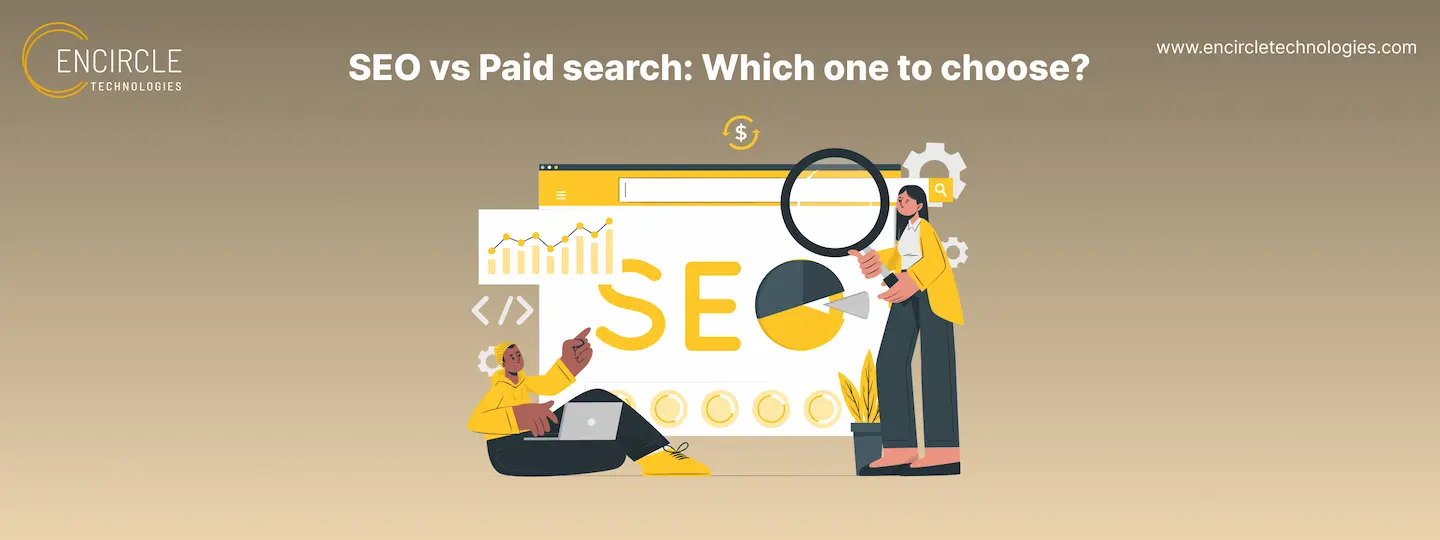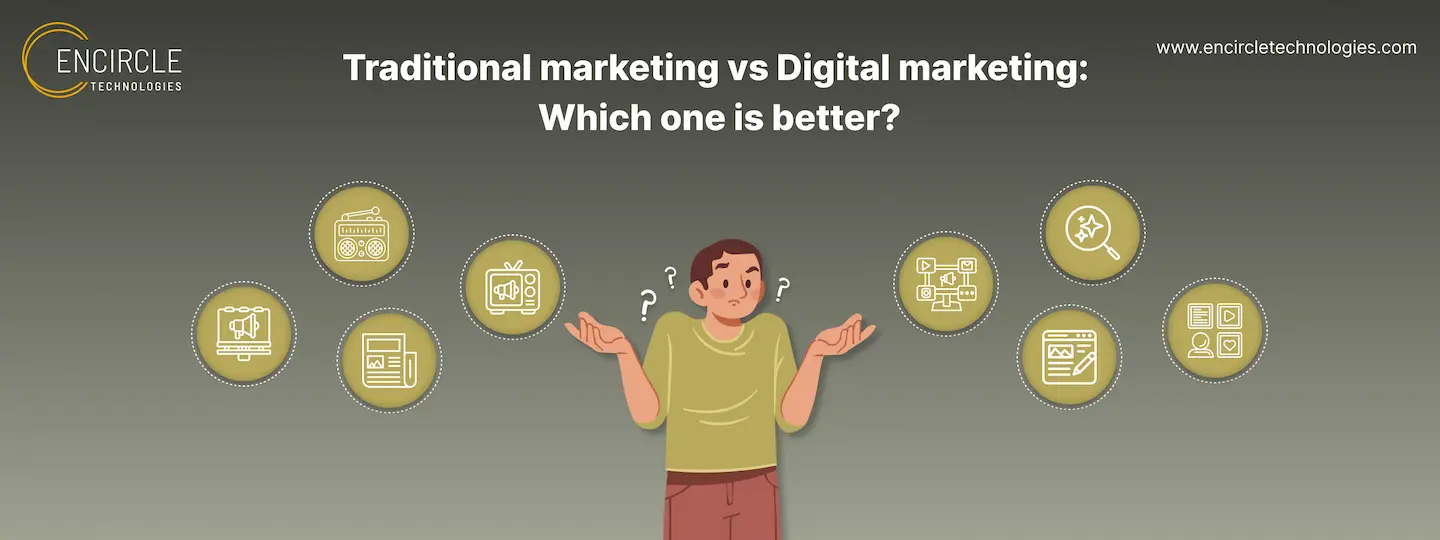Just having a website is not enough. To generate leads and sales with the website, it’s essential to work on online marketing methods.
When it comes to digital marketing, SEO (Search Engine Optimization) and PPC (Pay Per Click) are the most popular channels you will come across. If you are confused about whether you need SEO or paid search for your business, this post is for you.
There are certain factors you need to consider when choosing between SEO and PPC. The right online marketing method can vary from one business to another. Depending on your marketing budget, business goals, etc., you can choose SEO, PPC, or both.
Whether you choose SEO or paid search for your business promotion, both have their own pros and cons. In this post, we will explain the difference between organic and paid search so that you can choose the right one for your business.
What is SEO?

SEO or Search Engine Optimization is the process of increasing the quality and quantity of website traffic. The purpose of SEO is to improve rankings for the right search phrases.
Although it takes time for SEO to generate results, it’s worth it. The good thing about this digital marketing method is that it’s really cost-effective. When your site starts to rank on the top of SERP (search engine results page) and starts getting traffic, you won’t be charged any money.
On the other hand, whatever traffic you receive through PPC advertising costs money. Every time the user clicks on the ad, the advertiser is charged some fee.
SEO can be divided into two parts: on-page and off-page. On-page SEO consists of all the activities performed within the website. This includes title tag, meta description, header tags, internal links, etc. And off-page SEO includes brand mentions, guest posting, social media mentions, etc.
Pros of SEO
Let’s take a look at some advantages of SEO:
Relevant, targeted traffic
By focusing on long-tail keywords, it is possible to drive high-intent traffic. Getting higher search rankings for the right keywords can help you get relevant, targeted traffic to your website.
Build trust and credibility
Many users trust organic results more than paid results. Hence, when the site ranks higher on search engines, it builds trust and improves the credibility of the business.
Cost-effective
Whatever traffic you generate with SEO is completely free. Unlike PPC, SEO traffic won’t cost any money. The main cost will be hiring an SEO professional.
ROI
With SEO, you can generate leads at a less cost. Comparing it with traditional marketing methods, the return on investment of SEO is high.
Improved CTR
Users are more likely to click on organic results than paid ones. This results in a higher CTR (click-through rate).
Cons of SEO
Here are some disadvantages of SEO:
Time-consuming
The main downside of SEO is it’s time-consuming. It requires a lot of patience. Even after spending so much time implementing SEO, there’s no guarantee that your website will start ranking at the top of SERP (search engine results page).
Algorithm updates
To provide the best experience to its users, Google introduces algorithmic updates on a regular basis. If SEO is implemented wrong, the site may get an algorithmic penalty.
Also Read: How Web Design Impacts SEO?
What is PPC?

PPC or Pay Per Click is the online marketing method in which the advertiser is charged some fee every time someone clicks on the ad. This advertising method is ideal for businesses that want to generate instant results.
You have different types of PPC ads to choose from, including search ads, display ads, video ads, shopping ads, and retargeting ads. Unlike SEO, you don’t have to wait so long for the results. If your marketing budget allows, you can start a PPC ad campaign.
PPC advertising is also worth it when you are in a highly competitive industry. Getting SEO rankings can be difficult and time-taking when you are in a competitive industry. In such a situation, running paid ads is a viable option.
Pros of PPC
Here are the advantages of PPC advertising:
Instant results
One of the main reasons why many companies give more priority to PPC than SEO is it generates instant results. Unlike SEO, you do not have to wait for results with PPC.
Targeted traffic
Just like SEO, PPC advertising can also help you drive targeted traffic to your website. You can do that by adding high-intent keywords to the ad campaign. This would make it easy for your business to generate sales and high-quality leads.
Pay for top ranking
With PPC, you are paying for the top ranking on search engines. Unlike SEO, your website rankings won’t be affected due to algorithmic updates.
Marketing insights
For the PPC campaign, Google provides detailed insights into various metrics, including impressions, number of clicks, CTR (click-through rate), user location, device, etc. This data can help you improvise your PPC campaign.
Control your budget
With PPC, you get total control over your budget. It’s up to you how little or how high you want to spend.
Cons of PPC
Here are some cons of PPC advertising:
Expensive
If you have a limited budget, PPC marketing may not be the right choice. Every time someone clicks on your ad, you will be charged some fee. With some products/services, generating leads with PPC can be costly. And to keep a PPC campaign running, you will need constant funding.
Learning curve
PPC campaigns can generate fast results, but to get the best out of a PPC marketing strategy, some learning curve is required. Your paid search campaign would be a waste of time and money when it’s conducted without understanding essential metrics.
Some users dislike ads
Paid results are highlighted with the text “Ad” on them. Many users often jump directly to organic results. Even if your ad result shows up on the top of SERP, don’t expect your ad CTR to be as high as organic results.
What is Better SEO or PPC?
The answer to this question varies from one business to another. Depending on the business goals, marketing budget, etc., the right marketing method can differ for your business. For example, if you have a limited marketing budget, SEO is the right choice. However, if you want instant results and have a sufficient marketing budget, PPC is the right choice.
Or, you can even do SEO and PPC together. This strategy can be really effective. With SEO, you can drive organic traffic to your website, while PPC can help you recover missed search engine clicks.
Also Read: Traditional Marketing Vs Digital Marketing: Which One is Better?



